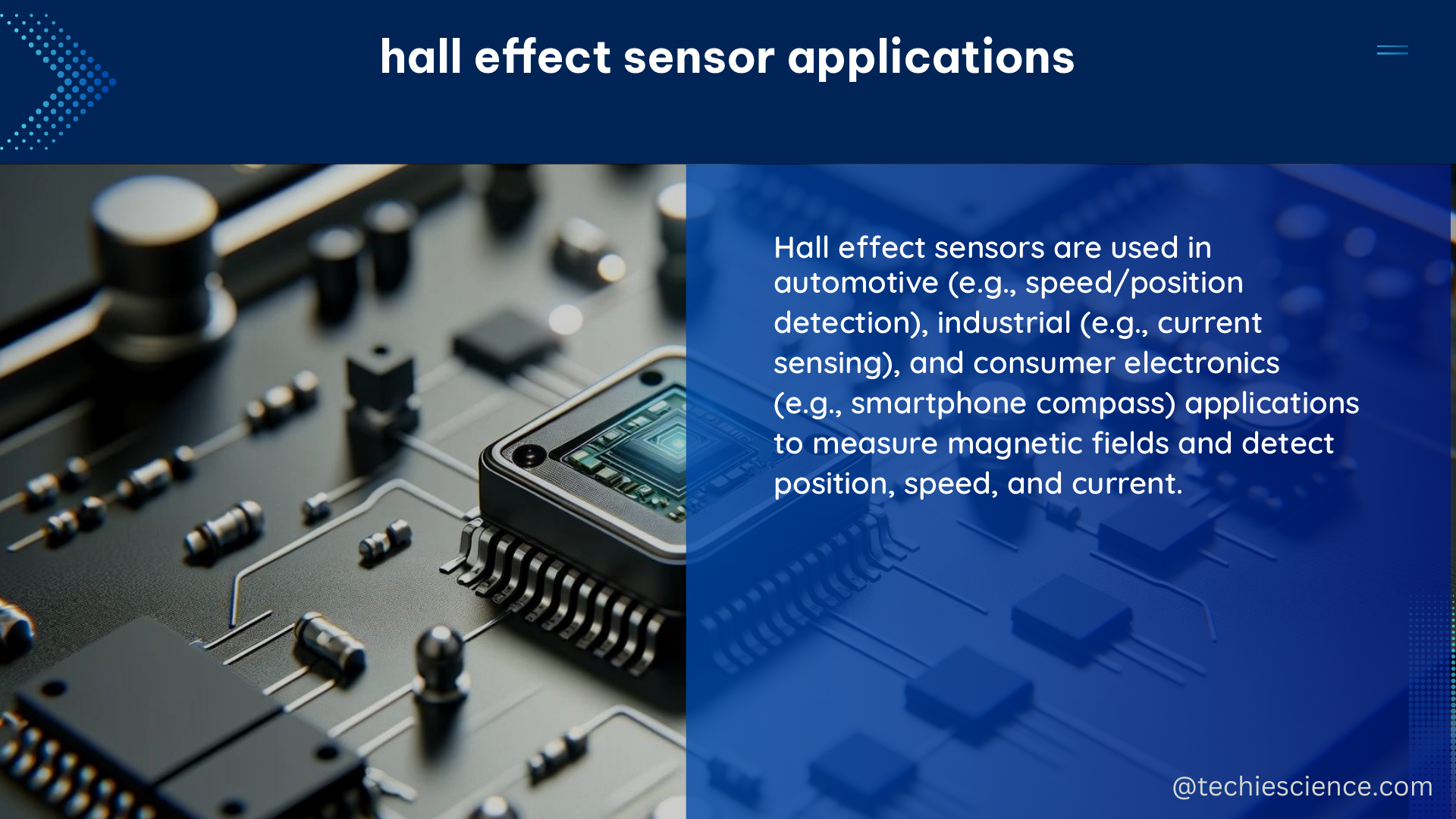Hall effect sensors are widely used in various applications due to their ability to measure magnetic fields and convert them into electrical signals. These sensors offer a range of benefits, including flexibility in magnet placement, integration with magnetic systems, and immunity to external noise. In this comprehensive guide, we will explore the technical details and specific applications of hall effect sensors.
Understanding Hall Effect Sensors
Hall effect sensors are electronic devices that measure the strength of a magnetic field. They work by detecting the voltage difference (Hall voltage) across a thin conducting material, which is proportional to the strength of the magnetic field applied perpendicular to the material. The DRV5055 from Texas Instruments is an example of a bipolar Hall position sensor, which responds to both positive and negative magnetic fields.
Sensitivity and Sensing Range
The sensitivity of the DRV5055 Hall effect sensor ranges from 14.3 to 63 mV/mT, depending on the specific device and the magnetic flux density. The linear magnetic sensing range of the DRV5055 is ±22 mT for some versions and ±44 mT for others. This wide range of sensitivity and sensing capabilities allows for versatile applications.
Measuring Magnetic Fields
To determine the magnetic field produced by a magnet, a gaussmeter or teslameter can be used. These instruments measure the strength of the magnetic field in a particular system, which can vary based on the materials present and potential interactions from nearby components.
Analog and PWM Output Hall Sensors
In addition to analog output Hall sensors like the DRV5055, devices with a PWM (Pulse-Width Modulation) circuit, such as the DRV5057, can also be used. These sensors provide more immunity to external noise due to the varying duty cycle ratio of the output pulse based on the sensed magnetic flux density.
Hall Effect Sensor Applications

Hall effect sensors find a wide range of applications in various industries, including:
Position Sensing
Hall effect sensors are commonly used for position sensing applications, such as detecting the position of a moving object or the rotation of a shaft. They can accurately measure the position of a magnet attached to the moving object, providing feedback for control systems.
Automotive Applications
In the automotive industry, Hall effect sensors are used for applications like crankshaft position sensing, camshaft position sensing, and throttle position sensing. These sensors help monitor the engine’s operation and provide feedback for engine control systems.
Industrial Automation
In industrial automation, Hall effect sensors are used for position feedback in robotic systems, linear actuators, and other motion control applications. They can precisely track the position of moving parts and provide accurate positioning information.
Current Sensing
Hall effect sensors can be used for current sensing applications, where they measure the magnetic field generated by the current flowing through a conductor. This allows for non-invasive current measurement, which is useful in power management, overcurrent protection, and motor control applications.
Power Conversion and Management
In power conversion and management systems, Hall effect current sensors are used to monitor and control the current flow, ensuring efficient and safe operation of the system.
Motor Control
In motor control applications, Hall effect current sensors are used to measure the motor’s phase currents, enabling precise control of the motor’s speed and torque.
Gear Tooth Sensing
Hall effect sensors can be used for gear tooth sensing, where they detect the presence of gear teeth as they pass by the sensor. This application is common in engine timing systems, where the sensor tracks the rotation of the crankshaft or camshaft to synchronize the engine’s operation.
Engine Timing Systems
In engine timing systems, Hall effect sensors are used to detect the position of the crankshaft or camshaft, providing critical information for the engine control unit to optimize the engine’s performance and efficiency.
Integrated Magnetic Systems
Hall effect sensors can be integrated into a single package with a magnetic system, combining both the sensor and the magnetic system into one unit. This integration simplifies the design and installation process, making it easier to incorporate Hall effect sensors into various applications.
Integrated Position Sensors
Integrated position sensors, which combine a Hall effect sensor and a magnet, are commonly used in applications such as linear position sensing, rotary position sensing, and proximity detection.
Instrumentation and Measurement Considerations
When using Hall effect sensors, it is important to consider instrumentation and measurement system considerations to ensure the best possible measurements. This includes performing an I-V (current-voltage) characterization of each contact to the sample to identify any non-linearity, and potentially lowering the source current to eliminate the non-linearity and improve the quality of the contact preparation.
Conclusion
Hall effect sensors offer a wide range of applications and benefits, including the ability to measure magnetic fields, flexibility in magnet placement, and integration with magnetic systems. By understanding the technical details and specific applications of these sensors, engineers and designers can leverage their capabilities to enhance various systems and devices. This comprehensive guide provides a detailed overview of hall effect sensor applications, equipping you with the knowledge to effectively utilize these versatile sensors in your projects.
References
- Understanding and Applying Hall Effect Sensor Data Sheets, Texas Instruments, June 2014, Revised December 2021, https://www.ti.com/lit/an/slia086a/slia086a.pdf?ts=1705304306871
- Hall Effect Measurement Handbook, Quantum Design, https://qdusa.com/siteDocs/productBrochures/Lake_Shore_Hall_Effect_Handbook.pdf
- Hall Effect Sensing and Application, Honeywell, http://denethor.wlu.ca/pc300/projects/sensors/hallbook.pdf

The lambdageeks.com Core SME Team is a group of experienced subject matter experts from diverse scientific and technical fields including Physics, Chemistry, Technology,Electronics & Electrical Engineering, Automotive, Mechanical Engineering. Our team collaborates to create high-quality, well-researched articles on a wide range of science and technology topics for the lambdageeks.com website.
All Our Senior SME are having more than 7 Years of experience in the respective fields . They are either Working Industry Professionals or assocaited With different Universities. Refer Our Authors Page to get to know About our Core SMEs.